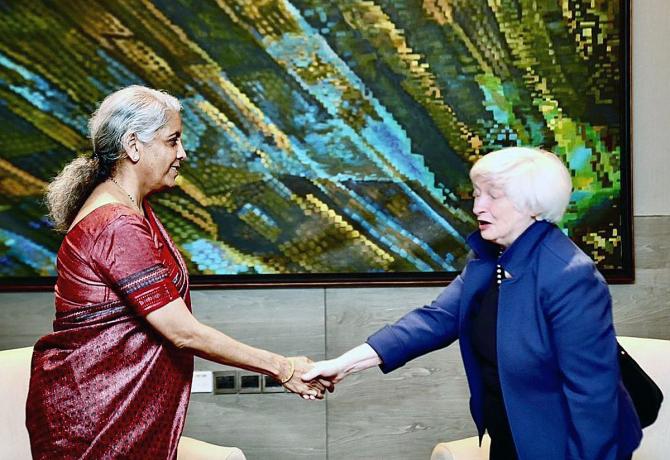India and the US on Monday committed to further improving bilateral ties, exploring alternate mechanisms for funding renewable energy and actively pursuing the G20 agenda which includes strengthening MDBs and taking coordinated action to deal with climate change.

Several issues, including climate action, rising indebtedness in low and middle income countries and digital public infrastructure, figured during a bilateral meeting between Finance Minister Nirmala Sitharaman and US Treasury Secretary Janet Yellen held on the sidelines of the G20 meeting of Finance Ministers and Central Bank Governors.
India, Sitharaman said, will "look forward to furthering ... bilateral interests through development cooperation and new investment opportunities through Alternate Investment platforms for renewable energy."
Yellen too in her statement said the US will "look forward to working with India on an investment platform to deliver a lower cost of capital and increased private investment to speed India's energy transition."
The US Treasury Secretary also stressed on the need for India and the US working together to press for more ambitious and specific reforms with respect to multilateral development banks' (MDBs) vision, incentive structures, operational approaches, and financial capacity to better address global challenges.
"We estimate that MDBs as a system could unlock $200 billion over the next decade just from the measures already being implemented or under deliberation as part of this process... It is also important to address the immediate need to boost the bank's concessional lending capacity for global challenges and support low-income countries to supplement ongoing efforts," Yellen said.
The G20 finance ministers in their last meeting in March had set up an expert group on strengthening MDBs.
The group has submitted its first report which focuses on the broadening of vision, financial capacity and modalities of funding of MDBs.
The second report, which is slated to be submitted in October, will exhaustively cover mechanisms for coordination among MDBs.
"The recently released G20 MDB Experts Group report is one recent useful input to this work, though we must only explore capital increase after the reforms in these areas have progressed further," Yellen said.
She said the US is home to the largest Indian diaspora outside of Asia, and it serves as India's largest export market.
"Bilateral trade between our two countries reached an all-time high last year, and we expect it to grow further in the years to come," Yellen added.
The US-India bilateral trade exceeded $191 billion in 2022, nearly doubling from 2014.
The collaboration between the two nations spans across a range of economic issues, including commercial and technological collaboration, strengthening supply chains, and catalysing the clean energy transition.
"I also appreciate India's focus on finalizing the historic Two-Pillar global tax deal in the Inclusive Framework, and I believe that we are close to reaching an agreement," Yellen added.
Under the global tax deal, about 140 countries, including India, have agreed to an overhaul of global tax norms to ensure that multinationals pay taxes wherever they operate and at a minimum of 15 per cent rate.
However, some vexed issues still need to be ironed out before its implementation.
At the bilateral meeting, Sitharaman said India and the US have reaffirmed the commitment to achieving substantial outcomes through close engagement.
"By leveraging each other's expertise and resources, we actively promote economic growth, foster innovation, and drive sustainable development," the finance minister said.
Sitharaman said the bilateral discussions highlight the commitment of India and the US to actively further the G20 agenda, including addressing critical global issues such as strengthening MDBs and taking coordinated climate action.
It also includes working on facilitating consensus to intractable issues associated with rising indebtedness of low and middle income countries; and, harnessing opportunities presented by crypto-assets and digital public infrastructure for financial inclusion.











 © 2025
© 2025